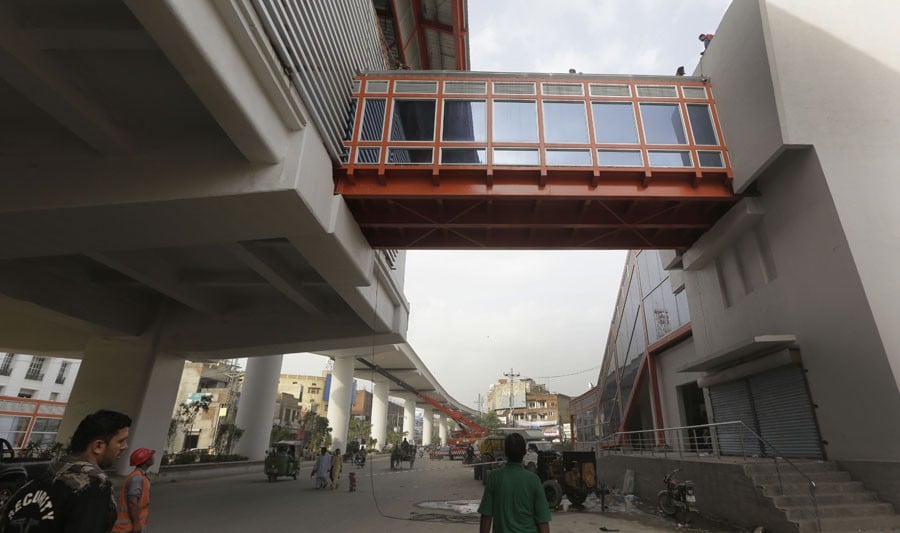
The multi-billion-rupee Orange Line Metro Train project, which was stayed for good 22 months, must restart soon, to save the country’s economy

There has been much speculation about the future of the multi-billion-rupee Orange Line Metro Train project, started most ambitiously by the former chief minister of Punjab, Mian Shehbaz Sharif (though the underground version of the same was originally conceived during Chaudhry Pervaiz Elahi’s time). The latest news is that it may have been put off till March 2019.
TNS learns that the Lahore Development Authority (LDA) has sent a proposal of Rs10 billion to the new government to restart the project. Additionally, the joint venture of CR-NORINCO to execute the project has refused to offer services for post-project maintenance and operations.
The project was expected to complete by 2017 but its construction was halted for almost 22 months, thanks to the stay issued by the Lahore High Court (LHC). A fresh completion date, March 2018, was announced once the Supreme Court of Pakistan nullified the stay and ordered the construction work to be resumed.
For the uninitiated, the OLMT is said to have a 27.1 kilometres long track. The train shall pass through 26 stations. Anarkali and the central stations will be underground, and the rest on elevated tracks. According to officials, more than 85 per cent work on metallic track and 92 per cent of the electrical and mechanical work is finished already. Moreover, 97 per cent of civil work on Package-I from Dera Gujjaran, GT Road, to Chauburji, and 95 per cent on Package-II from Chauburji to Ali Town is complete. Work on the depot near Dera Gujjaran and Stabling Yard near Ali Town is close to completion.
As per the agreement signed with the Chinese authorities, the project was expected to complete in 27 months flat. In December 2015, China approved Rs162 billion for the project, and the first installment of Rs33 billion was released in May 2016. The project was set to complete in August 2018.
A senior engineer says, on condition of anonymity, that nobody is sure about the completion date, or the Commercial Operation Date (CoD), although March 2019 is said to be the new deadline. "If the project doesn’t kick off by December 31 this year, Pakistan shall be liable to damages worth Rs80 per day," he reveals. "These include the rate of liquidated damages that varies from 0.2 per cent to 10 per cent of the total contract price of the project’s civil work, the employees’ salaries, dollar’s conversion rate, cost of machinery hired from the local contractors, etc."
However, in order to avoid damages an official request has been made to the Chinese authority to reconsider the loan agreements. Pakistani officials are hoping that their request shall be granted on humanitarian grounds.
"China is aware of the hurdles we are facing [in completing the project]. They understand that it’s a complex venture, and a stay of 22 months created a lot of complexities in meeting the target," says Syed Uzair Shah, General Manager Operation, Punjab Mass-transit Authority (PMA).
"A favourable response is expected from China as we have been positive in releasing payments to the Chinese contractors in the past. Also, the date when the damages would apply is July 31st, 2019 now," he adds.
According to the official agreement uploaded on the Punjab government’s website, "The case would be referred to the China International Economic and Trade Arbitration Commission (CIETAC), if the dispute of damages remains unresolved."
Aside from bearing the huge expenses as damages if China doesn’t consider Punjab government’s request, the government would have to pay subsidy per person for each trip and the mark-up amount after the completion of the project.
Once the train becomes operational, it can accommodate up to 1,000 people at a time, and will provide a fast commute to 250,000 people every day. There are plans to increase its capacity to 500,000 per day by 2025.
"The government will pay Rs151 subsidy per person for every trip. Besides, it has to pay Rs5.5 billion to China as mark-up for the first year," says Mariam Hussain, Assistant Professor at National College of Arts.
"The current [Orange Line Train] project is also against the feasibility study for Lahore Orange Line Metro Train conducted in 2006-08 by the Japan International Cooperation Agency (JICA) and Systra, a French consultancy for which Pakistan paid $9 million," she adds.
Questions on transparency and the agreements made with the Chinese authority have been raised at different forums, especially at the LHC and Supreme Court. Advocate Muhammad Azhar Siddique calls OLMT a white elephant and the brainchild of decision makers of the preceding government that would cause nothing but disaster to heritage and economy.
"This project is in violation of the PPRA Rules," he insists, "as NESPAK, being an independent organisation, could not be appointed as a consultant. Moreover, the NOCs issued by the Environment and Archaeology departments were illegal."
"Rs162 billion is the loan taken from Exim Bank, China, and Rs260 billion would need to be paid over a period of 15 years. It’s a huge amount, but the Punjab government has refused to disclose terms and conditions saying that it’s a sensitive international matter, which is ridiculous," he adds.
The project is still on hold as the interim government didn’t release funds for it. The LDA which acquired land for the project under the Land Acquisition Act 1894, has sent a proposal of Rs10 billion to the Planning and Development Department (P&W), Punjab, for approval. Work will remain halted till the funds are approved.
On June 24, 2014 China recommended CR-NORINCO to execute the project. Nevertheless, CR-NORINCO has refused to take care of post project maintenance and operations due to certain reasons.
"The Punjab Mass-transit Authority is going for international tender since the CR-NORINCO has refused to reconsider their request to keep the prior agreement intact. Now, the PMA will have to try to hire an international service provider according to the PPRA Rules," Shah says.